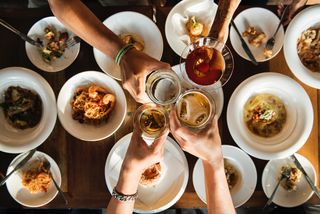Friends
Is #ThanksGAYving in Your News Feed?
Some LGBTQ people prefer to spend the holidays with their "chosen family."
Posted November 24, 2018
Did you notice any posts on your newsfeed this week about ‘Gaysgiving,’ ‘Friendsgiving,’ or 'ThanksGAYving'? Holidays of any kind are a time when families get together, share food, fight, make up, and generally just do what families do. For many in the LGBTQ community, however, holidays can be a difficult time of the year.

Often they may not be welcome at their family gatherings, or, if they are, they may only be welcome so long as they don’t bring their partner, or don’t do anything to ‘out’ themselves. This puts many people in a difficult position. How do you choose between the memories of your family traditions and the desire to include your partner in new traditions? Luckily, queer people are nothing if not resilient and this resiliency shows up every year during the holidays when groups of queer friends get together to re-invent family holiday gatherings and to make sure that the magic of the holidays isn’t lost, even if a connection to one's family of origin has been. While today we may see photos of these friendly gatherings with catchy hashtags like #GaysGiving #ThanksGAYving or #FriendsGiving, the tradition extends back beyond the birth of the hashtag and is commonly referred to as having a Chosen Family.
The term is a bit of a euphemism. It shouldn’t be interpreted as meaning that a young LGBTQ person goes out and finds themselves a new mom and dad and some queer siblings. It just means that the friends they do make within the LGBTQ community often play a more important role in their lives than an average friend might for a non-LGBTQ person. When something bad happens, these would be the people you turn to first and the people who will come to your aide when needed. Chosen Families are born out of necessity, not a choice. Most individuals would choose to have their own family fill these important roles rather than having to turn to others. However, when they do turn to others, it is a sign of the resiliency that exists among LGBTQ individuals that they are able to build such lasting and supportive bonds without the underpinnings of a biological connection.
One needs to look no further than the early years of the HIV/AIDS epidemic to see the role that chosen families played in the lives (and deaths) of LGBTQ individuals, particularly trans women and gay and bisexual men. Biological family members abandoned their sons when they found out they were HIV positive (which was often the same time that they found out that their sons were gay). Friends, lovers, ex-lovers, and even strangers from within the LGBTQ community stepped up to fill the caretaking roles that are traditionally filled by family members. They managed each other’s medical appointments, ensured that those in the hospital or hospice had visitors, that they had help getting their affairs in order, and ultimately, it was these chosen family members who planned and attended the funerals. Those who survived came out the other side of the epidemic having lost countless numbers of their ‘chosen family’ but also with an intense understanding of the necessity of chosen family. Thus, today, we still see many groups of LGBTQ friends spending the holidays together. Even as families have become more accepting of their LGBTQ members, chosen families continue to hold a special place in the hearts of LGBTQ folk, and thus the #GaysGiving dinners continue.
One of the reasons that researchers have theorized that chosen families are so important for LGBTQ folk is because they provide a shared level of experience that often cannot be found in an LGBTQ individual’s family of origin. Unless you grew up with LGBTQ parents or other close family members, no matter how accepting your family is, they are still unlikely to truly be able to empathize and understand your experiences as an LGBTQ person in a world that remains heterosexist, and sometimes outright homophobic. This means that LGBTQ youth often lack a family member who can tell them what it is like to come out, or what it will be like to be bullied and harassed based on their sexual or gender identity. Thus, there’s a greater drive to fill that role and to find other LGBTQ companions who can serve as mentors or provide advice or comfort in the face of daily challenges.

Ironically, one of the barriers to cultivating a chosen family today is the growing acceptance of LGBTQ people in society. Friends and family are far less likely to outright reject LGBTQ people, making that overwhelming necessity of finding a chosen family much less salient. As a result, many may just go about their lives without developing close bonds with other LGBTQ individuals, at least not to the extent that has been seen in past generations. At the same time, many still see the benefits of a closely-knit group of LGBTQ-identified friends, so only time will tell whether #GaysGiving will remain a tradition in the LGBTQ community or whether it will fade into something the elder-queers remember fondly, but with that kind of nostalgia that appreciates the past while simultaneously celebrating the social advances that may one day render LGBTQ chosen families unnecessary.
References
Blair, K. L., & Pukall, C. F. (2015). Family matters, but sometimes chosen family matters more: Perceived social network influence in the dating decisions of same-and mixed-sex couples. The Canadian Journal of Human Sexuality, 24(3), 257-270.
Dewaele, A., Cox, N., Van den Berghe, W., & Vincke, J. (2011). Families of Choice? Exploring the Supportive Networks of Lesbians, Gay Men, and Bisexuals 1. Journal of Applied Social Psychology, 41(2), 312-331.
Erosheva, E. A., Kim, H. J., Emlet, C., & Fredriksen-Goldsen, K. I. (2016). Social networks of lesbian, gay, bisexual, and transgender older adults. Research on aging, 38(1), 98-123.
Lyons, A., Croy, S., Barrett, C., & Whyte, C. (2015). Growing old as a gay man: How life has changed for the gay liberation generation. Ageing & Society, 35(10), 2229-2250.
Soler, J. H., Caldwell, C. H., Córdova, D., Harper, G., & Bauermeister, J. A. (2018). Who counts as family? Family typologies, family support, and family undermining among young adult gay and bisexual men. Sexuality Research and Social Policy, 15(2), 123-138.


